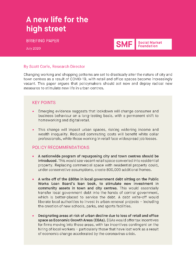COVID-19 is catalysing changes to our working and consumer habits. This is likely to have a significant impact on town and city centres. Rather than letting our high streets fade into obscurity, politicians can create an ambitious vision of repurposed urban space and reinvigorated communities.
Key points
- Emerging evidence suggests that lockdown will change consumer and business behaviour on a long-lasting basis, with a permanent shift to homeworking and digital retail.
- This change will impact urban spaces, risking widening income and wealth inequality. Reduced commuting costs will benefit white collar professionals, while those working in retail face widespread job losses.
Policy Recommendations
- A nationwide program of repurposing city and town centres should be introduced. This would see vacant retail space converted into residential property. Replacing commercial space with residential property could, under conservative assumptions, create 800,000 additional homes.
- A write off of the £80bn in local government debt sitting on the Public Works Loan Board’s loan book, to stimulate new investment in community assets in town and city centres. This would essentially transfer local government debt into the hands of central government, which is better-placed to service the debt. A debt write-off would liberate local authorities to invest in urban renewal projects – including the creation of new schools, parks, and sports facilities.
- Designating areas at risk of urban decline due to loss of retail and office space as Economic Growth Areas (EGAs). EGAs would offer tax incentives for firms moving into these areas, with tax incentives contingent on the hiring of local workers – particularly those that have lost work as a result of economic change accelerated by the coronavirus crisis.

Download The Report: PDF
